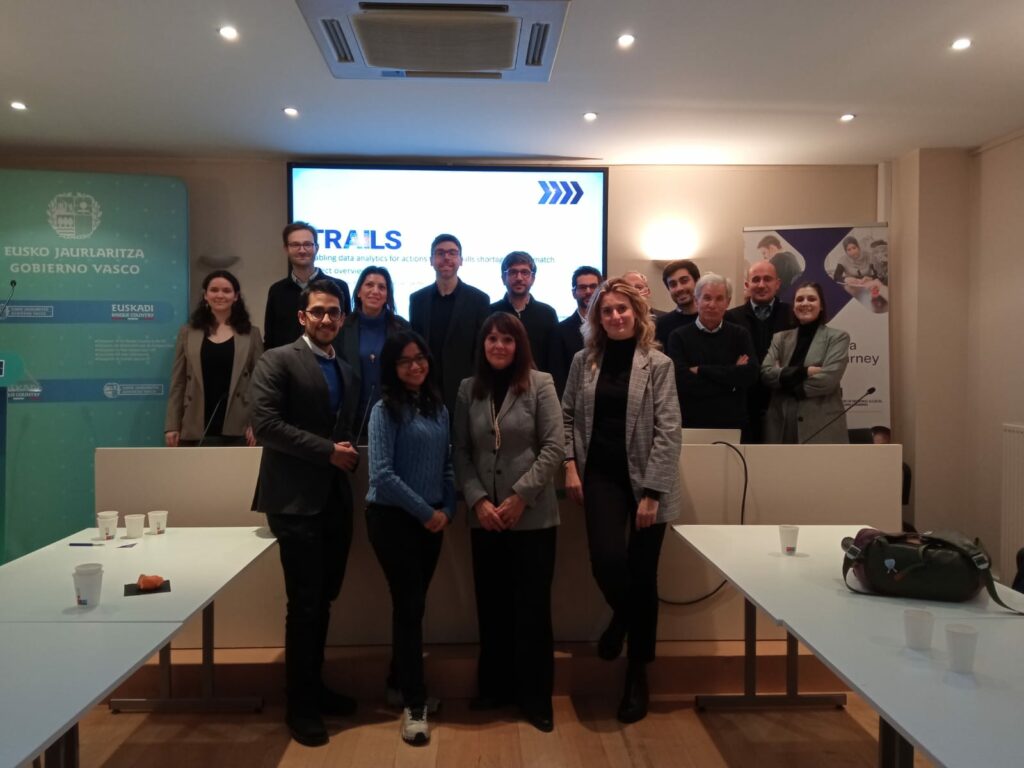TRAILS Marks a Year of Progress: Tackling Skills Mismatches in Europe
11/12/2024

The TRAILS project, funded under the Horizon Europe Research and Innovation Programme, celebrates a year of achievements in its mission to address skills shortages and mismatches across Europe. Officially launched in January 2024 in Brussels, the project has made significant strides in its first year, bringing together a consortium of experts and partners to deliver innovative solutions for improving labour market alignment.
The project kicked off with an in-person meeting hosted by EARLALL at the Basque Delegation to the EU in Brussels. This collaborative momentum continued at the second Transnational Partners’ Meeting, held in September 2024 at the Università degli Studi di Napoli Federico II in Naples, where progress across work packages was reviewed, challenges addressed, and future steps outlined.
Collaboration has been a cornerstone of the project’s success. TRAILS actively engaged with other Horizon Europe Research and Innovation Programme projects focused on skills through events such as the Skills Horizon Webinar in March 2024 and the Joint Research Seminar with SkillsPULSE, SkiLMeeT, and SKILLAB in December 2024, fostering synergies and knowledge sharing. Additionally, four distinguished members joined the External Advisory Board, including experts from leading universities and research institutes across Europe and the United States.
Communication and outreach have also been key priorities. TRAILS launched its website, a LinkedIn community, and an engaging project video to connect with stakeholders and disseminate its findings.
In its first year, TRAILS has delivered several critical research outputs, including:
- Reviews and Analyses: Reports examining the causes and impacts of skill mismatches, innovative digital tools for upskilling, and the incidence of skills mismatches across European labour markets.
- Platform Development: Insights into the functional requirements for the TRAILS platform, a cutting-edge toolkit designed to raise awareness of skills gaps, inform policy, and support labour market analysis.
Reflecting on the progress, TRAILS Project Coordinator, Ioannis Pragidis (Democritus University of Thrace, Greece) said,
Over the past year, the TRAILS project has made significant progress in analysing skills mismatches across Europe. Some of its major achievements include a new measure for skills mismatch, changes in educational mismatches before and after the pandemic, how technology and automation have altered skill demands across European labour markets and how mismatch has evolved over the last 15 years across European countries. A key strength of TRAILS is its use of diverse datasets, including Swedish employer-employee records, the European Skills and Jobs Survey (ESJS), and job advertisements, which generate actionable insights. Looking ahead, TRAILS plans to expand its analysis to address more questions for example the role of vocational training countries in alleviating skills match and provide targeted policy recommendations. These efforts aim to align education, training, and labour market needs, ultimately paving the way for improved job opportunities and economic resilience.
With a strong start and a clear roadmap, TRAILS is ready to continue advancing its objectives in the years ahead, contributing to a more resilient and adaptive European labour market.




